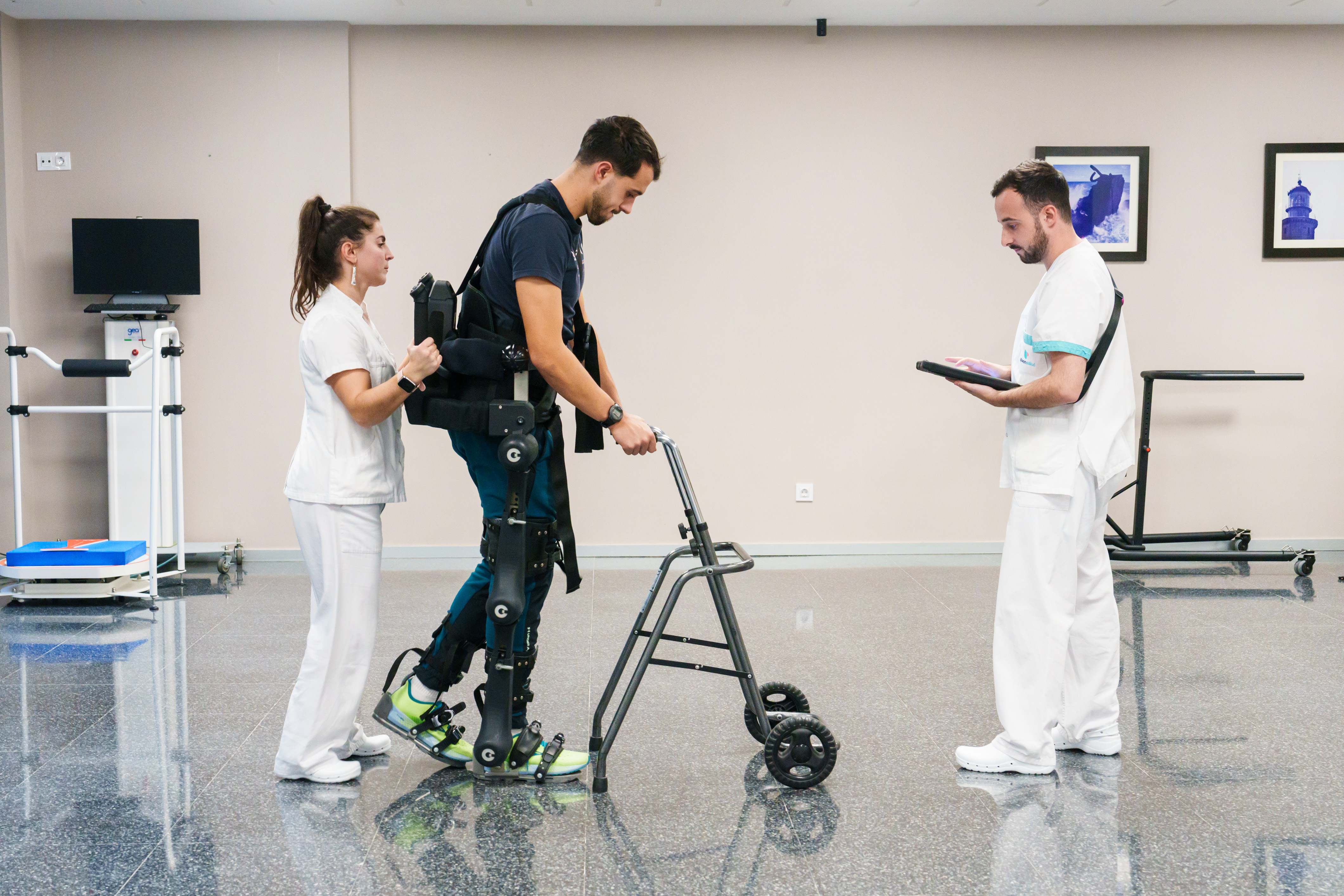Summary
- Profile Type
- Technology offer
- POD Reference
- TOES20250321007
- Term of Validity
- 21 March 2025 - 21 March 2026
- Company's Country
- Spain
- Type of partnership
- Commercial agreement with technical assistance
- Research and development cooperation agreement
- Investment agreement
- Targeted Countries
- All countries
Contact the EEN partner nearest to you for more information.
Find my local partner
General information
- Short Summary
- A Spanish SME specializing in medical robotics has developed CE-marked exoskeletons for neurological rehabilitation and mobility improvement. The implemented technology integrates advanced sensors and real-time feedback, providing personalized solutions for individuals with neuromuscular impairments or recovering from injury or surgery. This intelligent design enhances clinical outcomes and ensures high patient satisfaction.
- Full Description
-
A Spanish SME with extensive expertise in medical robotics, focuses on designing exoskeletons that address the needs of patients with neurological and motor impairments, including those with stroke, spinal cord injuries, or neuromuscular disorders.
Conventional rehabilitation approaches for neurological conditions often lack continuous performance monitoring and the ability to adapt therapy in real time. As a result, patient progress can be slower and less precisely guided. The developed exoskeleton provides data-driven, immediate insights to clinicians, supporting tailored therapy protocols that optimise recovery.
While traditional devices may offer mechanical support, they rarely integrate comprehensive sensor-based measurements of patient movements. This exoskeleton stands out for its continuous data collection (e.g., joint angles, force output, gait symmetry) and the capability to provide rapid adjustments, ensuring personalised therapy.
The exoskeleton stands out for several key features that enhance its functionality and adaptability:
- Ergonomic, Modular Design: Designed to fit diverse environments such as hospitals, rehabilitation clinics, and home care settings, promoting user comfort and improving adherence to therapy.
- Advanced Sensor Arrays: Equipped with comprehensive sensors that capture detailed neuromuscular metrics, allowing precise monitoring of patient performance and muscle engagement.
- Real-time Feedback: A specialised software platform provides instant insights, enabling clinicians to fine-tune therapies in real time for optimal results.
- CE-Marked Medical Product: The exoskeleton is officially certified and approved for medical use within the European market, ensuring compliance with high safety and quality standards.
- Proven Clinical Use: Robotic neurorehabilitation units are already in use at reputable medical centres such as Quirón, Fundación Jiménez Díaz, and Movex Clinics, with very positive feedback and notable improvements in patient outcomes.
The company is actively seeking partnerships to expand the adoption and development of its technology:
- Commercial Agreement with Technical Assistance: Collaboration with hospitals, rehabilitation centres, and medical device distributors is encouraged to integrate the exoskeleton into standard care practices. The company offers comprehensive training, on-site support, and customisation to ensure seamless implementation and optimal clinical outcomes.
- Research Cooperation: The company welcomes partnerships with universities, research institutes, and clinical organisations to support experimental trials, enhance the design through iterative improvements, and explore new features that further improve the effectiveness of neurological rehabilitation. - Advantages and Innovations
-
Continuous, Data-driven Monitoring: Instant feedback enables immediate, effective therapy adjustments.
Personalised Treatment: Adaptive software tailors therapy to each patient's progression and capabilities.
Lightweight Construction: Minimises fatigue, enabling longer and more productive therapy sessions.
Clinically Validated: Successfully implemented in notable medical institutions, yielding tangible patient progress. - Stage of Development
- Already on the market
- Sustainable Development Goals
- Goal 3: Good Health and Well-being
- Goal 17: Partnerships to achieve the Goal
- IPR status
- IPR granted
Partner Sought
- Expected Role of a Partner
-
The company is looking for hospitals, rehabilitation clinics, and especially medical device distributors interested in adopting and promoting CE-marked, data-driven exoskeletons in neurological rehabilitation settings. Potential partners should have a background in integrating advanced healthcare technologies and may also have the capacity to conduct clinical assessments.
In addition, they welcome collaborations with research institutions and universities focused on validating and enhancing the capabilities of their exoskeleton technology. - Type and Size of Partner
- SME <=10
- SME 50 - 249
- SME 11-49
- Big company
- R&D Institution
- University
- Other
- Type of partnership
- Commercial agreement with technical assistance
- Research and development cooperation agreement
- Investment agreement
Dissemination
- Technology keywords
- 06001013 - Medical Technology / Biomedical Engineering
- Market keywords
- 05003001 - Therapeutic services
- 05003006 - Other therapeutic (including defibrillators)
- 05004001 - Electromedical and medical equipment
- 05005022 - Other clinical medicine
- 05007007 - Other medical/health related (not elsewhere classified)
- Targeted countries
- All countries
Images
Videos
GOGOA PRESENTATION
